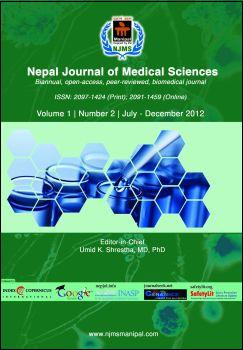A study on Complications of ventriculoperitoneal shunt surgery in Bir Hospital, Kathmandu, Nepal
DOI:
https://doi.org/10.3126/njms.v1i2.6612Keywords:
Hydrocephalus, ventriculoperitoneal shunt, slit ventricle syndrome, Staphylococcus epidermidisAbstract
Background: Ventriculoperitoneal shunt is one of the most commonly performed neurosurgical procedure, both on the elective and emergency basis. However this procedure is dreaded because of complications. There is lack of prospective studies on complications of shunt procedure. In this study, the indications for shunt, the types used and complications of ventriculoperitoneal shunts were studied.
Methods: This was a prospective study carried out in the national neurosurgical referral centre, Bir hospital, Kathmandu from April 2004 to March 2005.
Results: There were 109 ventriculoperitoneal shunt procedures during the study period. Among them 60 consecutive patients who fulfilled the inclusion criteria were enrolled for the study. There were 43 male and 17 female patients, with age ranging from 4 months to 75 years. Fourteen patients (23.3%) developed complications which included shunt block, shunt infection, over drainage and shunt extrusion.
Conclusion: About one fourth all patients who underwent ventriculoperitoneal shunt surgery developed complications. Shunt block and infections were the major complications.
DOI: http://dx.doi.org/10.3126/njms.v1i2.6612
Nepal Journal of Medical Sciences. 2012;1(2): 119-22
Downloads
Downloads
Published
How to Cite
Issue
Section
License
Copyright © by Nepal Journal of Medical Sciences. The ideas and opinions expressed by authors of articles summarized, quoted, or published in full text in this Journal represents only opinions of authors and do not necessarily reflect the official policy of Nepal Journal of Medical Sciences or the institute with which the author(s) is (are) affiliated, unless so specified.




